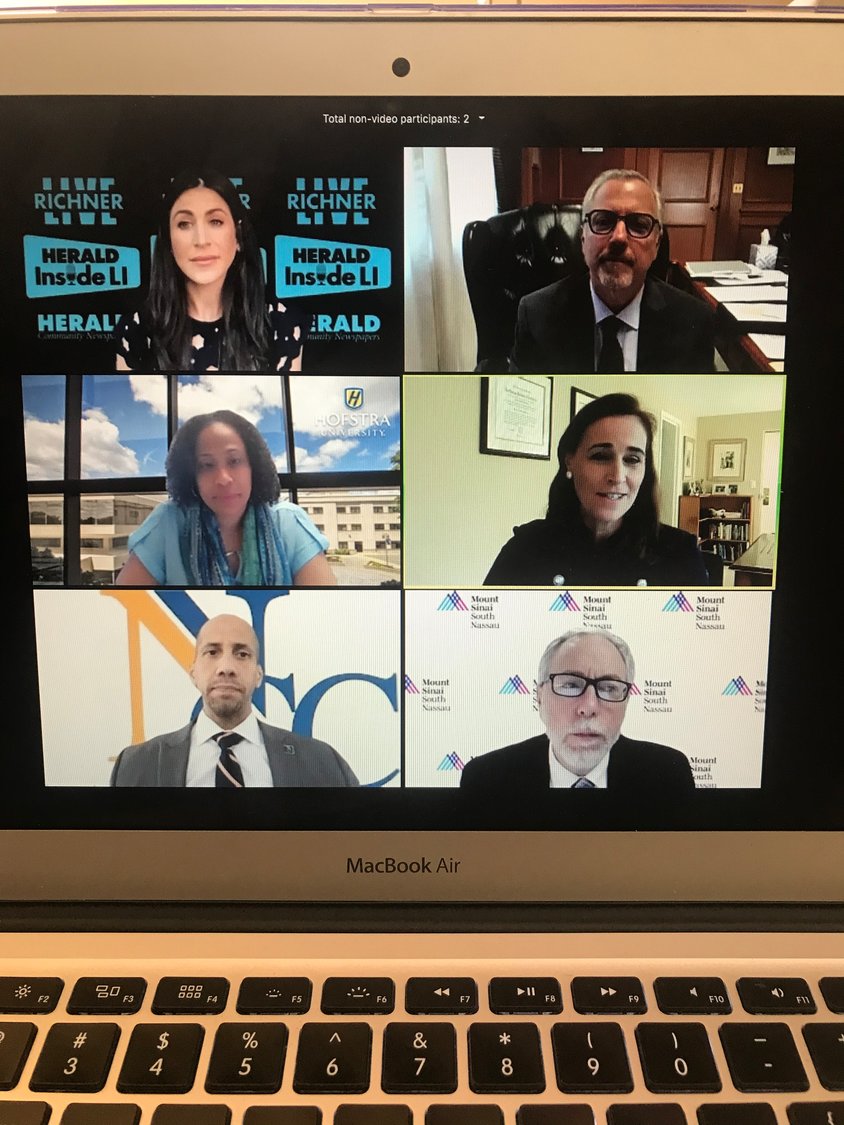Inside LI panel addresses return to college amid Covid-19
Higher education officials across Nassau County have been tasked with creating plans that balance health and safety and quality education for students returning to campus amid the coronavirus pandemic.
Although Covid-19 numbers are at their lowest since March, health experts say colleges must be vigilant and enforce strict guidelines in their reopening plans. On Aug. 21, Inside LI, produced by RichnerLive, hosted its second virtual panel discussion on topics related to “new normals” in different aspects of life. It featured several leaders in higher education to discuss their paths to a safe and productive fall semester.
The 45-minute webinar included panelists Dr. James Lentini, president of Molloy College; Dr. Christine Riordan, president of Adelphi College; Dr. Gabrielle St. Léger, assistant vice president and dean of students at Hofstra University and Dr. Jermaine Williams, president of Nassau Community College.
Dr. Aaron Glatt, chairman of the Department of Medicine at Mount Sinai South Nassau hospital in Oceanside, also joined to offer a medical perspective on how to open colleges and universities safely. Skye Ostreicher, of RichnerLive and Herald Community Newspapers, was the moderator.
“It’s almost like opening a mini city,” Riordan remarked. “We have to abide not only by the higher education guidelines, but by all of the other guidelines that may pertain to some of the things that we have on campuses — we have hotels with our residence halls, restaurants with our dining facilities, day care centers, transportation systems, sports teams, religious organizations [and] retail with our bookstores.”
Riordan noted that colleges worked together, and with state and county health officials, to develop plans that adhere to Centers for Disease and Control Prevention guidelines. At the same time, college presidents want to uphold high standards of education.
At Nassau Community College, the state’s largest community college, 93 percent of classes will be online. This will leave around 300 to 400 students on campus at any given time, which Wiliams called an “extreme drop from where we’d normally be.”
Williams said that the college is “providing the same high calibur education whether you’re in the classroom or taking a remote course.”
Lentini agreed that, at Molloy, students would receive quality education despite altering the mode of instruction. He noted that professors have been trained and retrained in remote teaching skills. “It’s not like in the spring where we had to turn on a dime,” he said. “This time we had time to do it.”
Aside from instruction, students go to college for social experiences, many of which will be lost this semester because colleges cannot hold large gatherings. St. Léger admitted that telling students, “no, we can’t do that,” will be difficult but necessary.
Hofstra University is currently in the process of staggering move-ins for more than 2,000 resident students, St. Léger said. Hofstra is launching educational campaigns to provide positive reinforcement of safety measures, such as mask wearing, social distancing and avoiding large gatherings. Student ambassadors, who normally hold social events, will now be tasked with helping to enforce those measures on campus.
“I want students to understand their impact on the campus, on their suitemates, on their classroom community,” St. Léger said “We need our students to understand their individual role.”
Each panelist said that if their own children were college students, they would feel comfortable sending them away to college given the universities’ thorough plans.
“I’m very impressed by the plans that all of the colleges have talked about,” Glatt said, while recognizing that no plan will be perfect. “I do think it’s important to have students go to college in person, however, with significant restrictions. That’s how we are going to defeat this until there is a practical vaccine available and distributed.”
He noted that a vaccine will not impact this semester of college because it will not be widely available until sometime in 2021. Therefore, colleges must be vigilant in monitoring the health of its students and acting quickly if a Covid-19 case arises.
Colleges are requiring resident students to test negative before moving into residence halls. They are also requiring commuter students to conduct health screenings and fill out a health form before attending classes each day.
Molloy has a contactless temperature-reading kiosk outside every building. Using face recognition, it scans each person in, takes their temperature and records it under their student or faculty I.D., Lentini said.
“I’m hopeful that if, in general, society takes this seriously,” Glatt said, “... we can have a close-to-normal educational program.”
InsideLI’s next virtual panel, “Why The Residential Real Estate Market Is So Hot,” is Thursday, Sept. 3, at 10 a.m. Register at liherald.com/insideli9-3.






